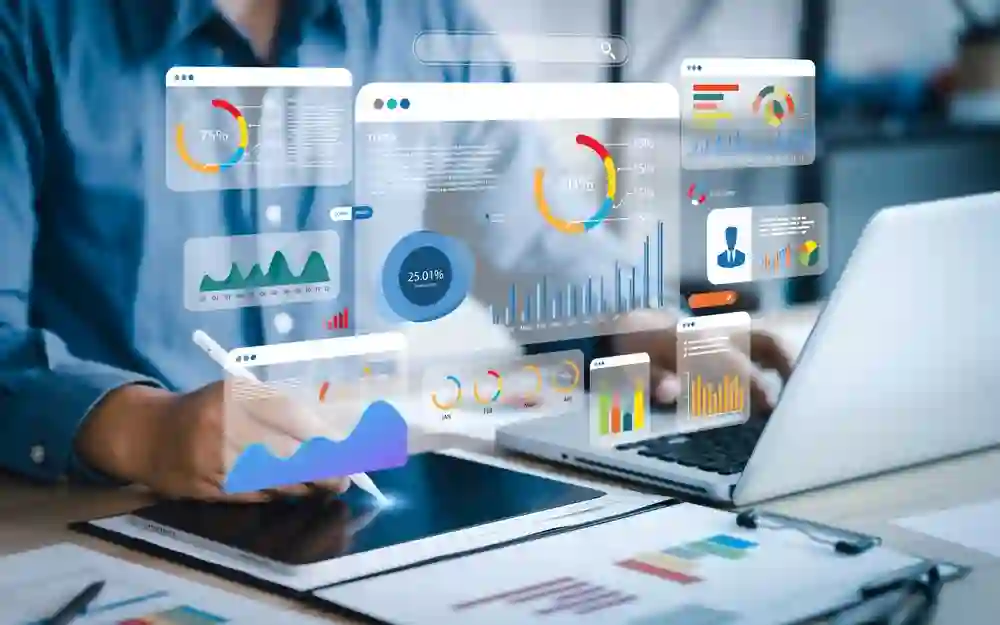AI in Marketing: How Companies Are Using AI to Improve Their Marketing Efforts
Are you interested in discovering how AI in marketing transforms customer segmentation, predictive analytics, and customer service? This article provides valuable insights for marketers and those interested in AI. Read on to find challenges and limitations and find future developments.

What is AI in Marketing? Artificial Intelligence (AI) is a rapidly evolving technology that is changing how businesses operate across all sectors. AI in digital marketing has become an indispensable tool for companies looking to improve their marketing efforts and gain a competitive edge. AI in marketing refers to using machine learning algorithms and other AI technologies to analyze and interpret large amounts of data and automate marketing processes.
Recent Statistics of AI in Marketing
Here are some recent statistics on the use of AI in marketing:
- According to a survey by Salesforce, 51% of marketers are currently using AI, and an additional 27% are planning to use it in the next two years.
- A report by MarketsandMarkets predicts that the AI in marketing market size will grow from $6.5 billion in 2020 to $40.3 billion by 2025, at a compound annual growth rate (CAGR) of 44.1%.
- According to HubSpot, the market for artificial intelligence (AI) is currently worth close to 100 billion dollars, and by 2030, it is predicted to reach a value of about 2 trillion dollars.
- According to Statista, artificial intelligence (AI) in marketing was predicted to have a 15.84 billion USD industry in 2021. By 2028, the value, according to the estimate, will surpass 107.5 billion.

How AI Is Used in Marketing?
AI is changing the marketing landscape in several ways. One of the most significant changes is the ability to collect and analyze vast amounts of customer data in real time. This data can be used to identify patterns and trends that were previously invisible, providing companies with valuable insights into customer behavior and preferences. It, in turn, allows companies to develop more personalized and targeted marketing strategies that are more likely to resonate with their customers.
AI in marketing is also changing the way companies approach customer segmentation. Rather than relying on traditional demographic or geographic data, AI algorithms can analyze customer data to identify more nuanced segments based on behavior, preferences, and purchasing history. It allows companies to tailor their marketing messages to specific segments and improve the effectiveness of their campaigns.
AI is transforming marketing by enabling companies to deliver more personalized and targeted messages, optimize their marketing campaigns, and improve their customer experience. As AI technology continues to evolve, we will likely see even more profound changes in the way companies approach marketing in the future.

AI in Customer Segmentation
Explanation of Traditional Customer Segmentation
Customer segmentation is dividing a company's customer base into groups based on shared characteristics or behaviors. Traditionally, customer segmentation was based on demographic data such as age, gender, and location. However, this limited approach can result in a one-size-fits-all marketing approach. With the help of AI, customer segmentation has become more sophisticated and effective.
How Is AI Improving Customer Segmentation?
AI is improving customer segmentation in several ways. The benefits of AI in digital marketing includes:
- First, AI algorithms can analyze large amounts of customer data from multiple sources to identify patterns and behaviors that may not be apparent using traditional demographic data. This data can include browsing history, purchase history, social media activity, and other digital interactions. By analyzing this data, AI algorithms can identify more nuanced segments based on customer preferences and behavior, allowing for more targeted and personalized marketing messages.
- Second, AI can improve the accuracy of customer segmentation by using machine learning algorithms to continually learn and adapt to changing customer behavior. Customer segments can be updated and refined in real-time based on new data, ensuring that marketing messages remain relevant and effective.

- Finally, AI in marketing can automate the process of customer segmentation, saving time and resources for companies. Rather than manually sorting through customer data and creating segments, AI algorithms can do this automatically, allowing marketing teams to focus on developing and executing targeted campaigns.
Examples of Companies Using AI for Customer Segmentation
Several companies are already using AI for customer segmentation with impressive results. For example, Netflix uses AI algorithms to segment its customer base based on viewing history, preferences, and other data. It allows Netflix to recommend personalized content to each customer, increasing engagement and retention.
Similarly, Airbnb uses AI to segment its customer base based on travel frequency, destination, and budget. It allows Airbnb to create targeted marketing campaigns and promotions for each segment, increasing bookings and revenue. AI and machine learning in digital marketing is revolutionizing customer segmentation by enabling companies to identify more nuanced segments based on customer behavior and preferences. By leveraging this data, companies can create more targeted and personalized marketing messages more likely to resonate with their customers.
AI in Marketing of Personalization
Personalization is tailoring marketing messages to individual customers based on their preferences, behavior, and other data. Traditionally, personalization was limited to simple tactics such as addressing customers by name in emails or offering personalized product recommendations. However, with the help of AI, personalization has become much more sophisticated and effective.
How is AI improving personalization?
AI is improving personalization in several ways.
- First, AI algorithms can analyze large amounts of customer data from multiple sources to create a more comprehensive profile of each customer. This data can include browsing history, purchase history, social media activity, and other digital interactions. By analyzing this data, AI algorithms can identify patterns and behaviors that can be used to create personalized marketing messages that resonate with individual customers.
- Second, AI can use machine learning algorithms to continually learn and adapt to changing customer behavior. Personalization can be updated and refined in real-time based on new data, ensuring that marketing messages remain relevant and effective.
- Finally, AI in marketing can automate the personalization process, allowing companies to deliver personalized marketing messages at scale. It can save time and resources for marketing teams and enable them to focus on developing more creative and effective campaigns.

Examples of Companies Using AI for Personalization
Several companies are already using AI for personalization with impressive results. For example, Amazon uses AI algorithms to create personalized product recommendations for each customer based on their purchase and browsing history. It has helped Amazon increase customer engagement and sales.
Similarly, Spotify uses AI to create personalized playlists for each customer based on their listening history and preferences. It has helped Spotify increase user engagement and retention. AI in advertising and marketing is revolutionizing personalization by enabling companies to create more targeted and personalized marketing messages that resonate with individual customers. By leveraging customer data and machine learning algorithms, companies can deliver personalized marketing messages at scale, increasing customer engagement and sales.
AI in Marketing Analytics
Predictive analytics uses data, statistical algorithms, and machine learning techniques to identify the likelihood of future outcomes based on historical data. Traditionally, predictive analytics has been a complex and time-consuming process that requires significant expertise and resources. However, with the help of AI, predictive analytics has become more accessible and effective.
How Is AI Improving Predictive Analytics?
AI is improving predictive analytics in several ways.
- First, AI algorithms can analyze large amounts of data from multiple sources to identify patterns and trends that may not be apparent using traditional statistical methods. It includes unstructured data such as text, images, and video, which can be analyzed using natural language processing and computer vision algorithms.
- Second, AI in marketing can use machine learning algorithms to continually learn and adapt to changing data patterns. Predictive models can be updated and refined in real-time based on new data, ensuring that they remain accurate and effective.
- Finally, AI can automate the process of predictive analytics, saving time and resources for companies. Rather than manually analyzing data and building predictive models, AI algorithms can do this automatically, allowing companies to quickly identify trends and patterns that can inform their marketing strategy.
Examples of Companies Using AI For Predictive Analytics
Several companies are already using AI for predictive analytics with impressive results. For example, Coca-Cola, one of the AI companies in the stock market, uses AI algorithms to analyze social media data and predict which marketing campaigns will likely succeed. It has helped Coca-Cola increase engagement and sales.
Similarly, American Express uses AI to analyze transaction data and identify which customers will likely cancel their cards. It has helped American Express proactively reach out to customers and offer incentives to retain them, reducing customer churn and increasing revenue. AI is revolutionizing predictive analytics by enabling companies to identify trends and patterns in data that may not be apparent using traditional statistical methods. By leveraging machine learning algorithms and automating the process, companies can quickly and accurately predict future outcomes, informing their marketing strategy and increasing revenue.
AI in Customer Service
Customer service is a crucial part of any business, as it can impact customer satisfaction, retention, and loyalty. Traditionally, customer service has involved human representatives responding to customer inquiries and resolving issues. However, with the help of AI and machine learning in marketing, customer service has become more efficient and effective.

How Is AI Improving Customer Service?
AI is improving customer service in several ways.
- First, AI-powered chatbots and virtual assistants can provide 24/7 customer support, reducing wait times and improving response times. Chatbots can answer common customer inquiries and resolve basic issues, freeing up human representatives to focus on more complex issues.
- Second, AI algorithms can analyze customer interactions and sentiment to identify patterns and trends. It can help companies identify common issues and improve their products and services to meet customer needs better.
- Finally, AI and ML in digital marketing can improve the accuracy and consistency of customer service responses. Unlike humans, AI algorithms can provide the same service and information consistently across all customer interactions, ensuring that customers receive accurate and reliable information.
Examples of Companies Using AI For Customer Service
Several companies are already using AI for customer service with impressive results. For example, H&M uses an AI-powered chatbot to provide customer support on their website and mobile app. The chatbot can answer common customer inquiries and direct customers to the appropriate resources, reducing wait times and improving customer satisfaction. Similarly, AI in marketing examples include Delta Airlines that uses AI-powered virtual assistants to help customers book flights, check flight status, and answer common inquiries. It has helped Delta improve response times and reduce the workload for human representatives.
AI is revolutionizing customer service by providing 24/7 support, improving response times, and providing consistent and accurate information to customers. By leveraging AI-powered chatbots and virtual assistants, companies can reduce wait times, improve customer satisfaction, and allow human representatives to focus on more complex issues.
Challenges and Limitations of AI in Marketing
Despite AI applications in marketing, there are several challenges and limitations that companies must address to ensure its successful implementation. Some of AI's key challenges and limitations in marketing include ethical concerns, limitations of current AI technology, and the need for human oversight and expertise.

Ethical Concerns
Ethical concerns are one of the most significant challenges facing AI in marketing. AI in marketing algorithms can collect and analyze vast amounts of consumer data, raising concerns about privacy, data security, and bias. For example, if AI algorithms are trained on partial data, they may replicate and amplify existing biases, leading to discriminatory outcomes.
Limitations of Current AI Technology
Another challenge is the limitations of current AI technology. While AI algorithms can analyze vast amounts of data and identify patterns and trends, they have yet to be able to replicate the complexity and nuance of human decision-making. AI algorithms also require large amounts of data to be effective, meaning that small businesses or those with limited data access may need help implementing AI effectively. Despite the potential of AI in marketing, there are still several limitations to current AI technology that must be addressed. These limitations include the following:
- Lack of common sense and intuition
Current AI systems rely on vast data to make predictions and decisions. While AI can analyze data and identify patterns, it needs to gain the common sense and intuition of humans, which can limit its ability to make accurate predictions in certain situations.
- Limited creativity
AI systems are programmed to optimize for a specific goal, and while they can generate new ideas, they need more creativity from human marketers. It can limit their ability to create truly innovative and unique marketing campaigns.
- Dependence on data quality
AI algorithms are only as effective as the data they are trained on. If the data is biased, the AI system may produce inaccurate or biased predictions. This dependence on data quality can be a limitation for companies with limited access to data or needing help to afford high-quality data.
- Cost
Building and maintaining AI systems can be expensive, particularly for small businesses that need more resources to invest in AI technology. It can limit the adoption of AI in marketing and give larger businesses a competitive advantage.
- Complexity
AI systems can be complex and require specialized expertise to build and maintain. It can be a limitation for companies that do not have in-house data science expertise and must rely on external vendors or consultants.
- Regulation
As AI becomes more prevalent in marketing, there is a growing need for regulation to ensure that AI systems are transparent, ethical, and fair. It can be a limitation for companies that must comply with regulatory requirements and may limit the potential of AI in marketing.
To overcome these limitations, companies must invest in human expertise to complement AI algorithms. Human marketers can provide the common sense, creativity, and intuition that AI lacks while ensuring that the data used to train AI algorithms is accurate and relevant. Companies can also leverage AI to automate repetitive tasks and improve efficiency, freeing up human marketers to focus on more strategic tasks. Finally, companies can work to address ethical considerations around AI by being transparent about how their algorithms work and ensuring that they do not perpetuate bias or discrimination.
How Can Companies Address These Challenges and Limitations?
To address these challenges and limitations, companies can take several steps.
- First, companies should prioritize ethical considerations when implementing AI in marketing, ensuring their algorithms are transparent, secure, and unbiased. It may involve hiring data ethics experts or third-party auditors to evaluate their AI algorithms.
- Second, companies should be aware of the limitations of current AI technology and invest in human expertise to complement AI algorithms. It may involve hiring data scientists or marketing experts who can work alongside AI algorithms to provide context and interpretation to the data.
- Finally, companies should consider the potential impact of AI on their employees and customers. While AI can improve efficiency and accuracy, it may also lead to job displacement or alienate customers who prefer human interaction. Companies should work to mitigate these potential negative impacts by providing training and education for employees and offering options for human interaction for customers who prefer it.
Discussion of Future Developments of AI in Marketing
Looking to the future, AI is expected to play an even greater role in marketing. As AI technology advances, we will likely see more sophisticated AI algorithms that can better understand human behavior and provide more personalized experiences. Additionally, AI is expected to become more accessible and affordable, making it easier for smaller businesses to adopt AI in their marketing efforts.
One area where AI in fintech is expected to significantly impact is voice-based interfaces and conversational marketing. With the rise of smart speakers and voice assistants, companies are exploring new ways to engage with customers through voice-based interactions. Some companies are already using AI-powered chatbots and virtual assistants to provide customer service and support, and we will likely see more advanced conversational interfaces in the future.
AI is already transforming marketing and is expected to continue to do so in the future. As AI technology advances, companies will have more opportunities to leverage AI to better understand and engage with their customers and to create more personalized and effective marketing campaigns.
Wrapping Note
AI transforms marketing by improving customer segmentation, personalization, predictive analytics, and customer service. AI enables companies to understand their customers better, deliver more personalized experiences and make more accurate predictions about customer behavior. However, AI in marketing also poses challenges and limitations, including ethical concerns, data quality issues, and limitations in current technology.



